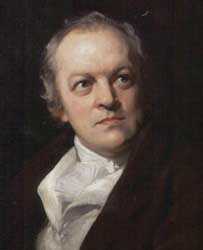
ویلیام بلیک
(William Blake)
ويليام بليك شاعر، عارف و نقاش بزرگ انگلستان در قرن هجدهم است كه او را از بزرگ ترين شاعران در انگلستان و هم رديف با شكسپير مي دانند. بليك را فردي انسان دوست، صلح طلب و آزادي خواه مي دانستند چرا كه او انديشه هايش را بي پروا در آثارش بيان مي كرد. عرفان او به طرزي بي بديل با عرفان اسلامي و به خصوص با انديشه هاي مولانا شباهت و همساني دارد. انديشه هاي عرفاني بليك كه در تضاد با كليسا و دربار بود، از او در محافل رسمي چهره اي منفور ساخته بود، تا جايي كه وي را مجنون و ديوانه خطاب مي كردند. بليك نقاشي چيره دست نيز بود و از نقاشي هايش به عنوان مكمل و همراه اشعارش استفاده مي كرد. از زيباترين و بهترين شعرهاي او مي توان به «راهب» و «گل آفتابگردان» اشاره كرد.
يك زندگي نامه مختصر
بليك در 28نوامبر 1757 در لندن چشم به جهان گشود. او سومين پسر يك جوراب فروش لندني بود. بدون داشتن معلم و به تنهايي به مطالعه پرداخت و كتاب مقدس، نوشته هاي جان ميلتون، متون كلاسيك يونان، متون لاتين، اشعار شكسپير و بن جانسون را خواند.
بليك در سال 1771 شاگرد يك حكاك شد. در سال 1779 به عنوان حكاك براي يك كتاب فروش محلي كار مي كرد. در سال 1784 به تدريج و با كمك يكي از دوستانش توانست يك حكاكي را به طور مستقل براي خود به راه اندازد. او به عنوان حكاك و شاعر به كار خود ادامه داد. بليك تمام عمر خود را به غير از سه سال، در لندن سپري كرد. از زماني كه چهار سال بيشتر نداشت، تصاويري ذهني مي ديد. كارهايش تركيبي بود از تصاوير ذهني اش، ظلم و ستم، مرگ، باورها و روياها.
بليك در دوازدهم آگوست 1827 چشم از جهان فرو بست. او را در گوري بي نام و نشان در قبرستان عمومي منطقه «بان هيل» به خاك سپردند. پس از مرگ بليك «وردزورث» ]words worth[ در وصف او چنين مي نويسد: هيچ شكي وجود نداشت كه اين مرد بيچاره مجنون بود، اما در جنون اين مرد چيزي بود كه بيشتر از سلامت رواني «لرد بايرون» و «والتر اسكات» براي من جذاب بود.
كتاب هاي شاعر
ويليام بليك بي شك يكي از برجسته ترين شاعران قرن 18 در انگلستان است. فردي هنرمند، عارف و شاعري كه همگان او را نخستين شاعر بزرگ شعرهاي عاشقانه انگلستان مي دانند. بليك در حوزه نقاشي نيز فعاليت مي كرد. او حتي به مدت 6سال در آكادمي سلطنتي به فراگيري نقاشي پرداخت.
همزمان با انقلاب فرانسه در سال 1789، نخستين شاهكارهاي بليك- «كتاب تل» و «ترانه هاي بي گناهي»- منتشر شدند. از ديگر آثار او مي توان به موارد زير اشاره كرد: «پيوند بهشت و دوزخ» در سال 93-1790، «انقلاب فرانسه» در سال 1791، «آمريكا: يك پيش گويي» در سال 1793، «تصورات دختران آلبيون» در سال 1793، «ترانه هاي تجربه» در سال 94-1793، «اروپا: يك پيش گويي» در سال 1794، «كتاب يوريزن» در سال 1794، «كتاب لوس» در سال 1795، «چهار زوآ» در سال 1804- 1795، «ميلتون» در سال 09-1804، و «بيت المقدس» در سال 20-.1804
تلفيق شعر و نقاشي
ويليام بليك به خاطر موضع تندي كه در برابر كليسا و دربار گرفته بود، در حدود صدسال از نظرها پنهان بود و پس از آن به جهان معرفي شد و بحث هاي فراواني در غرب و شرق درمورد اشعار و نقاشي هاي او صورت گرفت. تخيل و صحبت از آن محوري ترين مفاهيم شعر بليك هستند. او تخيل را قدرتي خلاق مي خواند كه انسان براي ساختن يا تغيير دادن پيرامون خود از آن استفاده مي كند: «شاهراه هاي زندگي من، ايده هاي من از تخيل هستند.»
بليك در يكي از نقاشي هاي خود كه به گونه اي مكمل و همراه اشعارش بودند، شخصيتي اسطوره اي را به تصوير مي كشد كه با هيبتي سالخورده و قوي هيكل، اما با دست و پايي به زنجير كشيده شده در گوشه اي كز كرده است. اين اسطوره به گفته منتقدان در واقع نماد شخصي است كه به دنيا زنجير شده و ازنظر جسمي و عقلي رشد مي كند. اما رشد عقلي او ازنظر عقل الهي و ماورايي نيست بليك اين شرح را در زير نقاشي خود حك كرده است.
بليك در طول زندگي خود همواره با فقر و قناعت روزگار مي گذراند و هميشه اهداف بزرگ تري نسبت به يك زندگي روزمره در سر مي پروراند. انسان دوستي، صلح جويي و آزادي خواهي از جمله انديشه هايي بودند كه او درپي آنها بود. در حقيقت مي توان ويليام بليك را عارفي جامعه گرا دانست. ردپاي اين انديشه ها در اكثر شعرهاي بليك به راحتي و به وضوح قابل مشاهده است. او با بياني رمانتيك اين انديشه هاي عرفاني و دوستانه را بازگو مي كرد.
دور شدن از ملكوت، مادي گرايي و علم پرستي، وحدت وجود و توجه به جهان دروني انسان و تخيل را مي توان از جمله انديشه هاي محوري و دغدغه هاي فكري اين شاعر و هنرمند انگليسي دانست. اين مفاهيم در قالبي شبيه آنچه كه ما سبك عراقي مي دانيم شكل گرفته و همساني عجيبي با عرفان اسلامي و بخصوص انديشه هاي مولوي در مثنوي معنوي و غزليات شمس دارد.بليك سرانجام در سن 70 سالگي پس از انتشار تقريباً 13كتاب شعر از دنيا رفت. او تا پايان عمر همچنان بي پروا بر انديشه هاي خود تأكيد مي كرد.
چند جمله از ويليام بليك:
- «انسان خود را محصور كرده تا دنيا را از طريق شكاف هاي غار خود ببيند.»
- «هيچ پرنده اي آنچنان اوج نخواهد گرفت، اگر تنها با بال هاي خود پرواز كند.»
- «انسان خود را محصور كرده تا دنيا را از طريق شكاف هاي غار خود ببيند.»
- «هيچ پرنده اي آنچنان اوج نخواهد گرفت، اگر تنها با بال هاي خود پرواز كند.»
برگرفته از: روزنامه كيهان، شماره 18755 به تاريخ 15/12/85

نظر